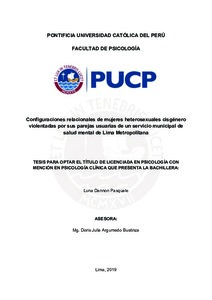Configuraciones relacionales de mujeres heterosexuales cisgénero violentadas por sus parejas usuarias de un servicio municipal de salud mental de Lima Metropolitana
Abstract
La presente investigación tiene como objetivo comprender cómo las mujeres cisgénero
heterosexuales violentadas por sus parejas configuran sus experiencias relacionales con Otros
significativos. El presente estudio, bajo un enfoque cualitativo y un diseño de casos múltiples,
contó con la participación de dos mujeres violentadas por sus parejas, usuarias del servicio de
consulta externa de salud mental de un municipio de Lima Metropolitana. En tres sesiones
distintas se aplicaron una entrevista semiestructurada y la entrevista de Paradigma de
Anécdotas Relacionales (RAP por sus siglas en inglés; Luborsky, 1998). Mediante un análisis
temático inductivo (Braun y Clarke, 2006) se encontró que ambas participantes comparten 6
configuraciones relacionales transversales (CR). De forma predominante, las CRs de las
participantes se ven atravesadas por un Self desubjetivado, devaluado y dependiente que busca
protección y reconocimiento de un Otro que lo violenta y subyuga. Asimismo, las participantes
presentan dificultades para expresar sus deseos y una tendencia a responder con sometimiento
frente a las respuestas de este Otro violento. En menor medida, se representan a sí mismas, por
un lado, desde la agencia y por otro, desde la agresividad y la desconfianza. En esa línea, se
observan similaridades sustanciales entre ambas participantes. No obstante, en cuanto a la
agencia se observan diferencias que podrían estar vinculadas a las diversas oportunidades de
desarrollo a la que cada una tuvo acceso. The present study aims to understand the way in which heterosexual cisgender women
battered by their partners organize their relational experiences. A qualitative multiple case
study was carried out. The participants were two battered women, users of a mental health
consultation service of a municipality in Metropolitan Lima. The data recollection process
consisted of three sessions, where a semi-structured interview and the Paradigm of Relational
Anecdotes (RAP; Luborsky, 1998) were conducted. Through an inductive thematic analysis
(Braun and Clarke, 2006) it was found that both participants share 6 relational configurations
(CRs). The CRs show that participants tend to experience themselves as devalued,
desubjectivated and dependent. They show needs of protection and recognition, but
experience the Other as someone who violates and subjugates them. Likewise, participants
present difficulties in expressing their desires and a tendency to respond with submission to
the responses of this violent Other. To a lesser extent, they represent themselves as agentic,
aggressive and distrusting. Thus, substantial similarities are observed between both
participants. However, regarding the agentic Self, there are differences that could be linked to
the various developmental opportunities to which each one has had access.
Temas
Género
Violencia contra la mujer
Mujeres
Psicoanálisis
Violencia contra la mujer
Mujeres
Psicoanálisis
Para optar el título de
Licenciado en Psicología con mención en Psicología Clínica
Collections
The following license files are associated with this item:






